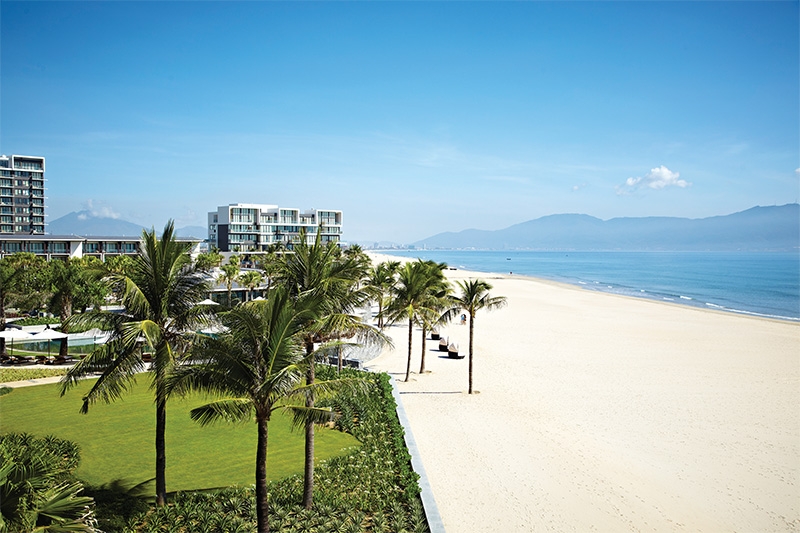Vietnam’s coasts remain an enticing investment magnet
 |
| Michael Piro, COO of Indochina Capital |
The real estate landscape in Vietnam has evolved considerably in the last decade. What used to be a market led by mainly foreign developers and contractors is now dominated by local developers, many of whom have focused their efforts on the hospitality sector.
According to the Foreign Investment Agency, despite the pandemic, the year-to-date total registered investment capital by non-nationals as of May 20 reached $13.9 billion, equal to 83 per cent over the same period in 2019.
The fact that foreign investors are still very keen on Vietnam proves that its market dynamics, in particular the young population and growing middle class, imply long-term sustained growth. For real estate, Vietnam’s affordability and good rental yields stand out compared to neighbouring markets such as Thailand. Vietnam’s rental yields on city properties remain adequate at 6-8 per cent for prime developments, while coastal resorts have enjoyed even higher returns.
The country also boasts one of the world’s fastest-growing tourism markets, with domestic arrivals and international arrivals growing at a compound annual growth rate of over 20 per cent and 18 per cent over the last five years, respectively.
Even amid the COVID-19 outbreak, Vietnamese travellers are looking forward to their next trip: Indochina Capital and Wink Hotels’ latest Vietnam Traveler Survey conducted in August revealed that 99.7 per cent of the 700 respondents stated they travel domestically for leisure at least once a year, and 68 per cent plan on resuming travel by the end of the year.
The survey also revealed how integral beach destinations are to the local travel market, as they are overwhelmingly the preferred holiday destination.
With over 3,000km of coastline and many islands, Vietnam is primed to become one of the world’s top beach destinations, boding well for hospitality developments.
 |
| According to the Vietnam Traveler Survey, the most popular leisure destinations in Vietnam include Danang, Dalat, and Nha Trang |
Inviting locations
The central coastal area is attracting both foreign and local investment. The aforementioned survey revealed Danang, Nha Trang, and Hoi An as the preferred holiday destinations in Vietnam, and money flows follow traveller flows.
This has been evidenced by the 22-hectare development in Ngu Hanh Son, the recently-approved Ba Na Hills by a large foreign investment fund, and two urban lifestyle hotels developed by an American/ Japanese joint-venture, also in Danang.
According to the International Association of Golf Tour Operators, 169 golf tourism companies operating in Asia plan to expand to Vietnam, and there is no doubt that the country’s effective handling of the pandemic has contributed to its position as a global investment destination. Some of the hospitality destinations set to be up-and-coming in the attraction stakes include Quy Nhon-Tuy Hoa, Van Don, and Ba Ria-Vung Tau.
The Vietnamese government has clearly grasped the link between infrastructure and economic growth, and these secondary cities have benefited from the improved accessibility and connectivity to major cities with more highways and airports planned in the future.
In fact, foreign funds and developers focused in Vietnam are already looking into transforming the coastal landscape of these destinations, with large-scale luxury developments in the pipeline.
For foreign investors new to Vietnam or looking to expand their portfolio here, acquiring operating assets has been an effective the strategy to get their feet wet. With the impact of COVID-19 on performance, newcomers and established firms alike can benefit from adjusted valuations of distressed assets all the while minimising risks related to introducing a new product to the market.
Strategic partnerships with local developers are also an effective strategy; even before the pandemic, Japanese and South Korean investors have been searching for reputable firms to partner with in order to enter the Vietnamese real estate market.
Laying the tracks
Key areas of improvement to further attract foreign capital into Vietnam’s coastal real estate include infrastructure development and legal framework reforms. Tourism infrastructure development helped Danang reach its status as the most popular domestic destination and will remain a key driver for the development of Vietnam’s tourism property market.
The legal framework on land clearance, acquisition, and issuance of ownership titles in Vietnam is structured differently than in other markets of the world, while the framework for new products, such as condotels, is yet to be built. The approval process is a major obstacle for foreign investors wishing to enter Vietnam, thus a streamlining of requirements in this area will undoubtedly help boost foreign capital inflow.
Opening up ownership of hospitality real estate products to foreigners is another step to create more demand and increase foreign investment in coastal areas and, currently, the government is already considering these transformational steps.
Presently, Vietnam ranks high in Juwai IQI’s top 10 most popular countries for investment and the government’s impressive handling of the pandemic is only helping to improve the nation’s attractiveness to foreign investors.
Furthermore, Vietnam is expected to maintain one of the world’s highest GDP growth rates in 2020, despite the fact that it will likely be just half of last year’s growth.
The hospitality sector is expected to remain resilient in the mid-term, Vietnamese travellers are travelling more and more, and the government is pushing for tourism to be a key driving sector for economic recovery.
The main benefactors will be Vietnam’s irresistible coastal hospitality sector and local and foreign investors who use their head start and invest early.
What the stars mean:
★ Poor ★ ★ Promising ★★★ Good ★★★★ Very good ★★★★★ Exceptional
Related Contents
Latest News
More News
- Wink Hotels to revolutionise the hotel industry (June 30, 2022 | 10:00)
- Wink Hotels revolutionises new breed of hotels for travellers (June 27, 2022 | 09:49)
- Getting back in the travel groove for 2022 (January 04, 2022 | 10:27)
- Bank and real estate giants team up (April 26, 2021 | 09:51)
- Indochina Kajima commences Phu Yen luxury tourism project (April 05, 2021 | 13:04)
- Foreign investment continues to flow into hospitality market (March 15, 2021 | 11:17)
- Satellite towns with purpose (January 19, 2021 | 11:00)
- Wink Hotels’ first hotel opening in Ho Chi Minh City (January 19, 2021 | 10:59)
- Seizmic shifts in Vietnamese real estate market (November 26, 2020 | 12:34)
- Wealth creation amid the coronavirus conundrum (November 09, 2020 | 08:20)

 Tag:
Tag:




















 Mobile Version
Mobile Version